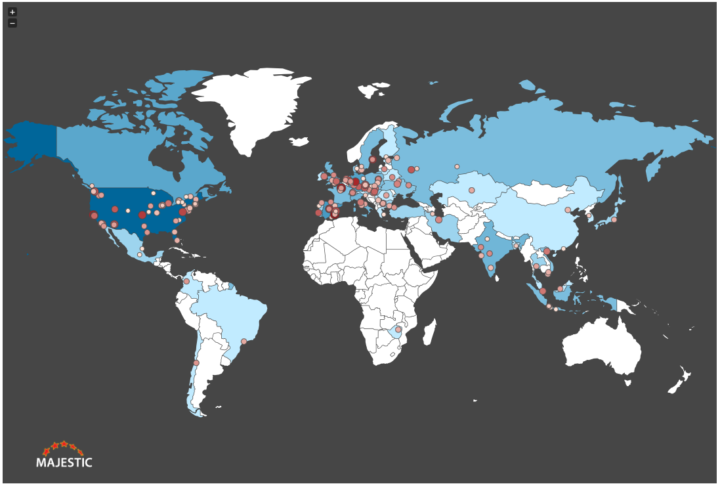Written by Juan Antonio Castillejos
Index
The topical authority of a website is a measure of the relevance and trust acquired by the site through the publication of original, truthful, current and quality content on a specific topic or geographic location.
When a user searches Google for information about a certain event, the search engine applies certain criteria to select the websites from which to extract the most relevant data and content.
Google also applies different criteria when offering reports or studies on a certain area of knowledge in response to a specific search for specialized information.
Some popularity analysis tools such as Majestic have been presenting indicators related to this concept for years, such as the Topical Trust Flow, calculated from the predominant themes of the sites from which we receive links:

As well as the geographic location of these domains:
It seems logical to infer that a website should naturally develop its network of relationships and links preferably in its geographic area of influence, where the majority of its audience is located.
While the importance of topical authority was already known, Google has provided more details on how it works to discriminate and offer specialized or topical content in search results.
The Californian company has shed more light on these discrimination criteria, clarifying the factors that determine the thematic authority and serve to select and display the contents of a given site in its results.
Importance or notability of the source for a location
Google confirms that it assesses the relevance of a website for the treatment of a particular topic or for queries made from a particular geographic location. If, for example, a certain population group tends to consult a specific source of information (e.g. a regional media), Google identifies this preference and creates a strong link between the queries received from that location and that media.
References to original reports
It is also capable of detecting how a report is cited from other reports as the original source of information. This helps the report to be better positioned in the results for that area of knowledge or study.
Source reputation
If the information source has a history of high quality reports or recommendation links from reputable professional associations, Google will favor your content with higher rankings in its results.
Conclusion: better to specialize
These new clarifications from Google on the relationship between the thematic or geographic specialization of a website and its ranking for related searches clarify the specific factors that influence this thematic authority.
Thus, and as a fundamental part of the E-E-A-A-T (Experience, Expertise, Authority, Trust), the creation of a reputation around a subject matter will increase the relevance of that source as an expert in that area of knowledge. This is a point that Google will continue to take into account in order to give more visibility to your content compared to other more generalist media.
Finally, the user’s location will also determine which information is more likely to be displayed based on their location and following the journalistic criterion of “proximity” as a factor in selecting the pages to be displayed in search results and Google News.

